.
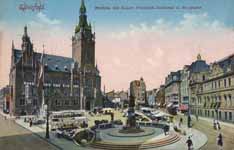
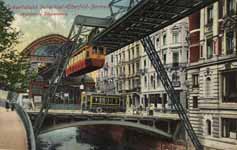
Wuppertal
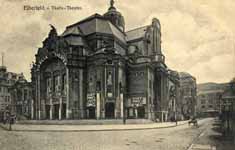
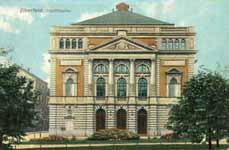
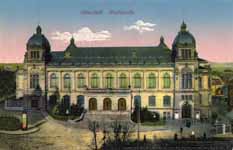
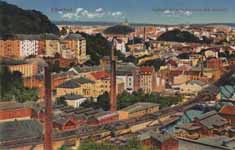
4, 5,
Wuppertal (Elberfeld)
Wuppertal (German pronunciation: [ˈvʊpɐtaːl]) is a city in North Rhine-Westphalia, Germany. It is located in and around the Wupper river valley, and is situated east of the city of Düsseldorf and south of the Ruhr area. With a population of approximately 350,000, it is the largest city in the Bergisches Land. Wuppertal is known for its steep slopes, its woods and parks, and its suspension railway, the Wuppertal Schwebebahn. Two-thirds of the total municipal area of Wuppertal is green space. From any part of the city it is only a ten-minute walk in one of the public parks or woodland paths.
In the 18th and 19th centuries, Wuppertal was one of the biggest industrial regions of continental Europe. Wuppertal today is still a major industrial centre, being home to industries such as textiles, metallurgy, chemicals, pharmaceuticals (Aspirin was invented in Wuppertal in 1897 by Bayer [2]), electronics, automobiles, rubber, vehicles and printing equipment.
The Wuppertal Institute for Climate, Environment and Energy is located in the city.
History
Wuppertal in its present borders was formed in 1929 by merging the early-industrial cities of Barmen and Elberfeld with Vohwinkel, Ronsdorf, Cronenberg, Langerfeld, and Beyenburg. The initial name Barmen-Elberfeld was changed in a 1930 referendum to Wuppertal (“Wupper Valley”). The new city was administered within the Prussian Rhine Province.
Uniquely for Germany it is a linear city, owing to the steep hillsides along the river Wupper. Its highest hill is the Lichtscheid which is 351 metres above sea level. The dominant urban centres Elberfeld (historic commercial centre) and Barmen (more industrial) have formed a unified built-up area since 1850. In the following decades, “Wupper-Town” became the dominant industrial agglomeration of northwestern Germany. In the 20th century this conurbation had been surpassed by Cologne, Düsseldorf and the Ruhr area, all with a more favourable topography.
During World War II, about 40% of buildings in the city were destroyed by Allied bombing, as were many other German cities and industrial centres. However, a large number of historic sites have been preserved, such as:
Ölberg, literally “Oil mountain”, Germany’s largest original working class district, protected as a historic monument. The name came about in the 1920s as the district continued using oil lamps while the surrounding bourgeois residential quarters were electrified. In traditional use the name "Ölberg" refers to the Mount of Olives in Jerusalem.
Brill, one of Germany’s largest districts of Gründerzeit villas, i.e. middle class mansions built by industrial entrepreneurs in the second half of the 19th century.
The US 78th Infantry Division captured Wuppertal against scant resistance on 16 April 1945.[3] After the last World War, the U.S.A. held the intellectual ownership rights to Bayer and other German companies and organisations. Wuppertal became a part of the British Zone of Occupation, and subsequently part of the new state of North Rhine-Westphalia in West Germany.
Main sights
In total, Wuppertal possesses over 4,500 buildings classified as national monuments, most dating from styles as Neoclassicism, Eclecticism, Historicism, Art Nouveau/Jugendstil and Bauhaus.
Main sights include:
Concert hall, a fine piece of turn-of-the-century architecture with outstanding acoustics (Stadthalle)
Wuppertal Dance Theatre (Tanztheater Wuppertal), a world-famous center of modern dance founded by the choreographer Pina Bausch
Engels house (Engels-Haus), 18th century-architecturally typical of the region. It houses a permanent display of materials associated with Friedrich Engels and other famous citizens of Wuppertal
Wuppertal Zoo, a large, nicely landscaped zoo
Botanischer Garten Wuppertal, a municipal botanical garden
Arboretum Burgholz, an extensive arboretum
Von der Heydt Museum, an important art gallery with works by 19th and 20th century artists. The first of Picasso’s works that ever appeared in public was displayed here.
Skulpturenpark Waldfrieden, a sculpture park with exhibition hall, founded by sculptor Tony Cragg
Schwebebahn
Main article: Schwebebahn Wuppertal
One of the city’s greatest attractions is the suspended monorail (“Wuppertaler Schwebebahn”), which was established in 1901. The tracks are 8 m (26.25 ft) above the streets and 12 m (39.37 ft) above the Wupper River.
Wuppertal in the arts
The play Die Wupper by Else Lasker-Schüler takes places in Elberfeld.
The 2000 movie The Princess and the Warrior by Tom Tykwer, was filmed in Wuppertal.
In the 1974 Wim Wenders film Alice in the Cities, the main characters visit Wuppertal.
A Lufthansa A340-600 D-AIHM (delivered 2006) is named after the city of Wuppertal. It primarily operates long haul flights from Munich Airport.
In the 2011 film "Pina", several of the dance sequences take place in and around Wuppertal. In several sequences, the elevated tram is used as a backdrop.
Notable people from Wuppertal
See also Category: People from Wuppertal
Friedrich Engels, philosopher, historian, co-author of the Communist Manifesto (with Karl Marx)
Johannes Rau, former Federal President of Germany
Alice Schwarzer, one of the leaders of the German second wave feminist movement
Tom Tykwer, film director (“Run Lola, Run”, “The Princess and the Warrior”), co-founder of X-Filme syndicate
Rita Süssmuth, former President of the German Parliament
Horst Tappert, actor
Linda Kisabaka, athlete
Pina Bausch, choreographer
Friedrich Bayer, founder of the Friedrich Bayer paint factory, later Bayer AG
Arno Breker, sculptor
Rudolf Carnap, philosopher of science
Udo Dirkschneider, singer in heavy-metal band Accept
George Dreyfuss, bassoonist, composer
Hermann Ebbinghaus, psychologist who studied memory
Hans Knappertsbusch, orchestra conductor
Hans Peter Luhn, computer scientist
Else Lasker-Schüler, expressionist poet
Harald Leipnitz, actor
Ulrich Leyendecker, composer
Reimar Lüst, astrophysicist
Steffen Möller, satirist, soap-opera star and TV celebrity in Poland; the most popular German[citation needed] in Poland
Tyron Montgomery, Oscar-winning film director
Simone Osygus, swimmer
Siegfried Palm, cellist, director of Hochschule für Musik Köln, Intendant of Deutsche Oper Berlin
Julius Plücker, physicist
Hans Singer, economist
Helmut Thielicke, theologian
Bettina Tietjen, television presenter
Günter Wand, orchestra conductor
Sulamith Wülfing, artist and illustrator
Peter Brötzmann and Peter Kowald, noted innovators in modern improvised music
Christoph Maria Herbst, actor
Sports
Association football
In football, Wuppertal's most popular club is Wuppertaler SV Borussia, who currently play in the Regionalliga West, the fourth tier of the German football league system. Playing their home games at the Stadion am Zoo, the club, which was relegated from the 3rd Liga in 2009, looks back on a rich and eventful history, since it was established in a merger between the two leading Wuppertal clubs SSV Elberfeld 04 and TSG Vohwinkel 80 in 1954. The club spent a total of seven years in the first division of German football, three of which in the Bundesliga, which they were promoted to in 1972. In their first season in the nationwide first division, the club reached a remarkable fourth place and qualified for the UEFA Cup for the first and only time in its history. After a first-round-defeat by the Polish side Ruch Chorzow and another two widely unsuccessful Bundesliga campaigns, the club disappeared from the top flight again and has yet to return.
Team handball
In handball, Wuppertal's currently most successful club is Bergischer HC playing in the 1st Bundesliga. BHC originates from a 2006 contract between LTV Wuppertal and rivals SG Solingen from the nearby city of the same name, which merged both clubs' squads and managements, as well as renamed SG Solingen's professional section to Bergischer HC. The club's name derives from the Bergisches Land (lit. “Country of Berg”), the historical and cultural region both cities are located in. LTV Wuppertal is still existent in its old structure, but due to the departure of their entire squad, they were relegated three times ever since, to the fifth tier Verbandsliga. They play their home games at both Wuppertal's Uni-Halle (4,100 seats) and Solingen's Klingenhalle (2,600 seats).
Wuppertal's past most successful club are afore-mentioned LTV Wuppertal. LTV spent most of their seasons in the 2nd and 3rd tier, before they merged with Wuppertaler SV's handball section in 1996, to form HSG LTV/WSV Wuppertal. The new handball combination immediately promoted to the Handball-Bundesliga and finished 8th in their first and only season in the top flight, before dissolving again in 1998. However, the departure of Wuppertaler SV still allowed LTV Wuppertal, whose handball section were renamed HC Wuppertal for the rest of their top-flight-days, to play another three seasons in the Bundesliga, before returning to the 2nd division.
Volleyball
In volleyball, A!B!C Titans Berg. Land is the new name of Wuppertal's Volleyball-Bundesliga club, formerly the volleyball section of Bayer Wuppertal and briefly known as Wuppertal Titans. The club itself originated in Leverkusen and promoted to the Bundesliga in 1978. Reacting to low attendances, the eponymous Bayer AG decided to relocate the volleyball team to Wuppertal in 1992 where there also is a Bayer-funded club. Since the move, the club won various titles including the German championship in 1994 and 1997 and the German cup in 1995. Also, they finished as runner-up in the 1995-96 European Cup Winners' Cup, losing only to Greek side Olympiacos S.C. in the final. After the wide-reaching retreat of the Bayer AG from less popular professional sports in 2008, the club acquired its current name. There, however, still exists a cooperation between the former partners, especially in the amateur and youth sections.
Basketball
Perhaps one of the most successful Wuppertal sports clubs was the women's basketball team of Barmer TV (known as BTV Wuppertal between 1994 and 2000 and BTV Gold-Zack Wuppertal between 2000 and 2002). The 11-time German champion and 12-time German cup winner won a remarkable nine back-to-back doubles between 1994 and 2002. In 1996, they also won the EuroLeague Women as the first and so far only German team, beating Italy's SFT Como in the final, and therefore even achieved a treble in that season. In 1997, they closely missed out on a back-to-back treble by losing to French side CJM Bourges in the EuroLeague final. In 2002, the club withdrew from the Bundesliga due to financial problems. One year later, the club's main sponsor Gold-Zack Werke filed for insolvency.
Wuppertal co-hosted the 1998 FIBA World Championship for Women as one of seven host cities.
Roller hockey
In roller hockey, (also known as rink hockey) Wuppertal club RSC Cronenberg are current holders of the German championship and the German cup in both men's and women's competitions. In total, the men won eleven German championships and nine cups, the women nine championships and eight cups. The club plays its home games at the Alfred-Henckels-Halle.
Wuppertal hosted the 1997 Rink Hockey World Championship, the 2004 Ladies Rink Hockey World Championship, as well as the 1992 and 2010 Rink Hockey European Championship. In 2011, local club RSC Cronenberg are set to host the Ladies Rink Hockey European Championship.
Education
There are two institutions of higher education in Wuppertal.
University of Wuppertal (Bergische Universität Wuppertal)
College of Theology, Wuppertal/Bethel (Theologische Zentrum Wuppertal)
Transport
Railways
Wuppertal is well connected to the rail network. The town lies on the Cologne–Hagen and the Düsseldorf–Hagen railway lines and is a stop for long-distance traffic. The central station is located in the district of Elberfeld. Regionalbahn trains and some Regional-Express trains also stop at Oberbarmen, Barmen, Ronsdorf and Vohwinkel. There are also S-Bahn stations in Langerfeld, Unterbarmen, Steinbeck, Zoologischer Garten and Sonnborn.
The rail services that operate on the mainline through the valley are the RE 4 (Wupper-Express), RE 7 (Rhein-Münsterland-Express), RE 13 (Maas-Wupper-Express), RB 47 (Der Müngstener), RB 48 (Rhein-Wupper Bahn) and three Rhine-Ruhr S-Bahn services: the S 8, S 9 and S 68 (peak hours only). Every 30 minutes, it is served by a long-distance (Intercity-Express, InterCity, EuroCity or City Night Line) service in each direction.
With the exception of the line from Wuppertal to Remscheid (and continuing to Solingen and operated as the RB 47) and the Prince William Railway to Essen (now S-Bahn line S 9), all of the branch lines connecting to main line in the city of Wuppertal are now closed. This includes, among others, the Düsseldorf-Derendorf–Dortmund Süd railway (the Wuppertaler Nordbahn), the Burgholz Railway, the Wuppertal-Wichlinghausen–Hattingen railway, the Wupper Valley Railway and the Corkscrew Railway. Thus, there were once 31 stations in the Wuppertal area, including nine stations on the mainline.
International relations
See also: List of twin towns and sister cities in Germany
Twin towns — sister cities
Wuppertal is twinned with:
Israel Beersheba, Israel
Germany Berlin-Tempelhof-Schöneberg, Germany
Slovakia Košice, Slovakia (since 1980)[4]
Poland Legnica, Poland
Nicaragua Matagalpa, Nicaragua
France Saint-Étienne, France
Germany Schwerin, Germany
Russia Yekaterinburg, Russia
United Kingdom South Tyneside, United Kingdom
Photogallery
View on Wuppertal
Section of the floating tram over the Wupper
Typical steep street in Wuppertal.
Sculpturepark Waldfrieden - Tony Cragg Points of View (2008)
View on Burgholz woods with typical Bergisches farmerhouse
Panoramic view over Ölberg quarter in Wuppertal
Notes and references
^ "Amtliche Bevölkerungszahlen" (in German). Landesbetrieb Information und Technik NRW. 31 December 2010.
^ Marvin Brendel. "110 Jahre Aspirin" (in German). GeschichtsPuls. Retrieved 2011-05-22.
^ Stanton, Shelby, World War II Order of Battle: An Encyclopedic Reference to U.S. Army Ground Forces from Battalion through Division, 1939-1946, Stackpole Books (Revised Edition 2006), p. 147
^ "Partnership towns of the City of Košice" (in Slovak). © 2007-2009 City of Košice Magistrát mesta Košice, Tr. SNP 48/A, 040 11 Košice. Retrieved 2009-07-12.
From Wikipedia, All text is available under the terms of the GNU Free Documentation License

